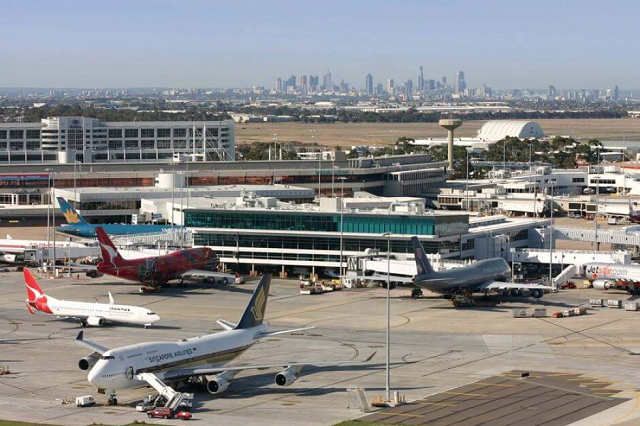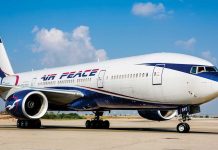Passenger traffic on domestic routes in the country dropped by over 30 per cent in the first half of 2018, compared with same period last year.
The airlines attributed the development to slowdown in economic activities, as well as low purchasing power.
Records on passenger movement by the Federal Airports Authority of Nigeria (FAAN) and the Nigerian Civil Aviation Authority (NCAA) also confirmed the low passenger traffic in 2018 compared with the previous year.
For example, in the first six months of 2017, the Murtala Muhammed International Airport (MMIA), the busiest airport in the country, recorded 2,644,034 passengers on domestic flights.
But in the same period in 2018, the airport recorded 1,803,317 passengers.
Also, at the Nnamdi Azikiwe International Airport, Abuja, FAAN recorded 1,907,682 in the first six months of 2017, higher that the 1,702,020 the agency report in same period in 2018.
In fact, the airports that operate only domestic service recorded low passenger movement in the first half of 2018 when compared to the same period in 2017.
The Executive Chairman of Airline Operators of Nigeria (AON), Mr. Nogie Meggison, who also confirmed this, said despite the fact that Nigeria overcame economic recession in 2017, income level of households was yet to improve because of the fragile economic growth.
According to Meggison, air travel is one of the barometers to gauge the health of a nation, saying whenever a country is doing well, it will reflect on the number of people that travel by air.
“As I always say, Nigerian aviation is not a stand-alone. It is part of the bigger economy of Nigeria and contributing to the GDP. It is obvious that aviation is the quickest barometer to check any economy.
“And if you check the Nigerian travelling populace, 70 to 80 per cent of those travelling are business people, as compared to the outside world where only 40 per cent are business people, 30 per cent tourists and the other 30 per cent are students and others.
“In Nigeria if you check the flights going to Abuja, 80 to 85 per cent are on business purpose and once these people don’t have business to do, it is obvious that there won’t be any movement because if you are not going to do business, no travelling. So it is a clear quick indication and barometer for the economy.
“So, if the economy is not performing as expected and businessmen are not moving, the airlines will not find the passengers.
“Once the economy begins to jump, business starts to move; then you see movement in our airports. Where 80 to 85 per cent of the passengers are doing business, most of them are not seeing any business to do now. I guess what is happening in Abuja right now is more politics than business. So it is the politicians that are moving,” he said.
Meggison stressed the need for Nigeria to take advantage of its demography to grow its aviation sector.
“We can make Nigeria the hub and to make us the hub, we need to improve on our infrastructure. As we improve on our infrastructure, other people will transit through Nigeria. And when this is done, we will jump-start the aviation sector,” he said.
The spokesman of the Nigerian Civil Aviation Authority (NCAA), Sam Adurogboye, told THISDAY that the low passenger traffic was a reflection of the prevailing economic situation, noting that the aviation industry cannot be insulated from the rest of the economic mix.
“Air travel and the aviation sector respond to the prevailing economic situation; just like it affects other sectors. In air travel, there is low season and there is also high season. Even on international flights, there are times seats are fully booked and there are also times of flying empty seats. But safety remains our number priority. We don’t toy with it.
“Nigeria is not an exception of the low passenger traffic. To have improved load factors depends on some other variables such as flying modern equipment, good customer care, competitive fare regime, laudable safety and security records. If an airline now chooses to toy with safety, it will have the regulator to contend with. If it escapes the eagle-eyed regulator, one day, accident will catch up with him. God forbid,” Adurogboye said.
THISDAY also learnt that the total number of operating aircraft in the domestic routes has shrunk to about 36 from about 58 last year.
It was gathered that some airplanes have gone on checks overseas; some are not airworthy – Aircraft on Ground (AOG) in the industry.
Investigation also revealed that some airlines that operated in 2017 have temporarily stopped flight service.
The insufficient supply of aircraft has also exacerbated flight delays as one aircraft is scheduled to operate many flights in a day.
THISDAY also learnt that the available aircraft record high load factor as there is high demand of limited equipment and airlines are making good business.
However, the spokesman of Air Peace, Chris Iwarah, told THISDAY that the airline has not experienced significant drop in passenger traffic.
“We record average of 100-120 passengers in our Lagos, Abuja and Port Harcourt flights, but during mid day load factor can come down to 70 passengers, but overall, it is average of 100-120 passengers. But I must say that more and more people prefer to fly Air Peace because they trust that whatever it is, they must fly beacuse we have enough aircraft, so you may not use Air Peace to judge the trend of the market,” he said.
Also confirming that high demand due to less number of aircraft in operation, Head of Communications of Arik Air, Adebanji Ola, acknowledged that the airline’s flights have been recording high load factor.
“We have been recording high load factor more than we have witnessed in the last five to six years. Maybe because there is less number of aircraft in operation, but for us, it has been so good so far,” he said.













